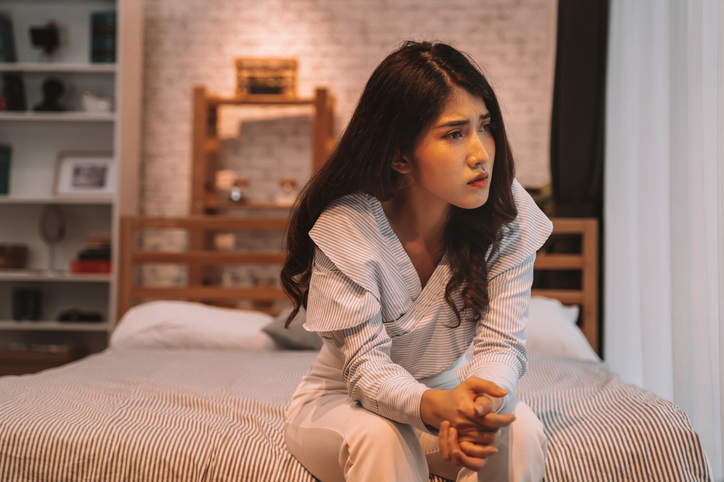We’ve all heard people say, “I just love my alone time!” But what if that’s not the whole story? Sometimes, what we think is a preference for solitude might actually be a sign of antisocial behavior. Let’s get into 18 signs that could indicate you’re not just an introvert who enjoys peace and quiet, but someone who might be struggling with antisocial tendencies.
1. You can’t remember the last time you initiated social contact

Enjoying alone time is fine, but if you realize you haven’t reached out to anyone—friend, family, or acquaintance—in ages, and the thought of doing so feels overwhelming, it might be time to reflect on why. This goes beyond simply being busy or distracted. You might find that you’re always waiting for others to make the first move. And when eventually receive invitations or messages? You might hold off on responding or ignore them altogether. This passive approach can result in increased isolation and a shrinking circle of support.
2. Your default response to invitations is “I’ll think about it”

Using this phrase occasionally is acceptable, but if it’s your automatic response to every invitation—even when you know you have no intention of going—it could be a sign you’re being avoidant. This noncommittal response is a delaying tactic, and you’re hoping the event will pass or the inviter will forget. You may experience anxiety at the thought of giving a firm answer, fearing both the commitment of saying yes and the potential conflict of saying no. This habit can annoy friends and family, who may eventually stop inviting you altogether.
3. You’ve perfected the resting “leave-me-alone” face

Having a naturally serious expression is one thing, but if you’ve intentionally cultivated a mug that screams “Don’t talk to me” to ward off potential interactions, it might be a sign of antisocial behavior. Maybe you actively frown or scowl in public spaces, avoid eye contact at all costs, or use body language that clearly communicates a desire to be left alone (like crossing your arms, turning away from others, or wearing headphones even when there’s no music playing). Does this successfully deter unwanted interactions? Sure, but it can also prevent positive social experiences.
4. Your phone is perpetually on “Do Not Disturb”

It’s healthy to take breaks from constant notifications. However, if your phone is always silenced, and you rarely respond to calls or messages, it might be a sign that you’re actively avoiding social connection. You get intense anxiety when you see notifications piling up, or feel relieved when your phone battery dies. You may have stopped checking your voicemail altogether or have set up elaborate auto-reply systems to minimize direct communication.
5. You’re a professional at canceling plans

Life happens, and sometimes we need to raincheck. But if you find yourself habitually canceling plans at the last minute (or worse, not showing up at all), it’s worth examining. This isn’t just about the occasional cancellation due to genuine conflicts or emergencies. We’re talking about a pattern of making plans with no intention of keeping them, or feeling an overwhelming sense of relief when you find an excuse to cancel.
6. You’ve mastered the art of the Irish goodbye

Leaving a social gathering without saying farewell is your standard exit strategy. You carefully plan your escape routes at social events, waiting for moments when no one is watching to slip away unnoticed. This habit can extend to all areas of your life—leaving work without telling colleagues, exiting family gatherings without a word, or even abandoning online conversations mid-discussion. While you might justify this as avoiding unnecessary social niceties, consistently leaving without acknowledging others is kind of rude (sorry, not sorry).
7. You feel relief when plans fall through

We all occasionally feel relieved when a social engagement gets canceled, but if you consistently feel joy or relief when plans fall through, that’s an anti-social red flag. This relief goes beyond the occasional “Yay, I can stay in tonight!” moment. You might find yourself hoping for cancellations, checking the weather for storms that might lead to event postponements, or even feeling disappointed when something you were secretly hoping would be canceled goes ahead as planned.
8. You’re always the first to leave (if you show up at all)

If you’re constantly watching the clock at parties and looking for the earliest opportunity to exit, it might be more than just a desire for alone time. In some cases, you might arrive late to minimize your time at the event. This constant need to escape social situations can be a sign of social anxiety or antisocial tendencies, and it can negatively impact your relationships as others may feel that you don’t value their company or the event itself.
9. You view socializing as a chore rather than enjoyment

While not every social interaction will be fun, if you consistently view spending time with others as a tedious obligation rather than a potentially enjoyable experience, it could indicate antisocial tendencies. During social interactions, you might be constantly aware of the passage of time, counting down the minutes until you can leave. This persistent negative view of socializing can lead to a self-fulfilling prophecy, where your attitude makes social interactions genuinely unpleasant, further reinforcing your aversion to them.
10. Small talk feels like a medieval torture chamber

While many people find small talk a bit tedious, for antisocial individuals, it can feel painful. This goes beyond slight discomfort—we’re talking about experiencing extreme anxiety, irritation, or even physical symptoms like sweating or increased heart rate when faced with casual conversation. This can make everyday interactions, like chatting with a cashier or making conversation with a coworker in the elevator, feel like monumental tasks.
11. You’ve ghosted more people than you can count

Ghosting is unfortunately common these days But if you regularly disappear on people without warning, leaving a trail of confused friends, family members, and acquaintances in your wake, it could be a sign of antisocial behavior. This is a pattern of abruptly ending communications, leaving social media groups without explanation, or even changing your contact information to avoid interactions. You might rationalize this behavior as “avoiding drama” or “cutting out negativity,” but if it’s a recurring pattern, it could indicate a deeper issue with social connections.
12. The idea of teamwork makes you panic

Collaboration is a normal part of life, whether at work or in social settings. But for someone with antisocial tendencies, the prospect of working closely with others can trigger intense anxiety or frustration. This aversion to teamwork can manifest in various ways: consistently choosing solo projects over group work, becoming irritable or withdrawn during team meetings, or even considering changing jobs to avoid collaborative environments.
13. The thought of making new friends exhausts you

While it’s normal to feel some anxiety about meeting new people, if the idea of forming new friendships feels like an insurmountable task, it could be a sign that you’re dealing with more than just introversion. When forced into situations with new people, you might experience intense anxiety, struggle to engage in conversation, or feel an overwhelming urge to escape. This can lead to a stagnant social life and missed opportunities.
14. You prefer pets to people

This goes beyond simply loving your pets or feeling more comfortable around animals. You might find yourself canceling plans with friends to spend time with your dogs, or using your cats as an excuse to avoid social situations. In extreme cases, you might prioritize your relationship with your fur children to the detriment of human relationships, like refusing to travel or attend important events because you don’t want to leave your pets.
15. You’ve turned your home into a big barrier

Creating a cozy living space is great, but if you’ve gone to extreme lengths to ensure no one can drop by unexpectedly or easily reach you, it might be a sign of antisocial behavior. Perhaps you’ve disconnected your doorbell or ignore knocks at the door. With social media, this might manifest as blocking or restricting access to your online profiles or using aliases to avoid being found. While everyone needs a safe space, if your home has become a barrier between you and the world, it could be a sign of deeper issues with social interaction.
Enjoy this piece? Give it a like and follow PsychLove for more!








